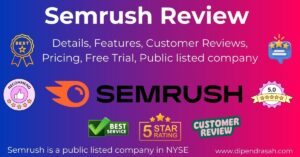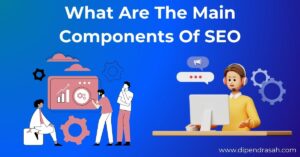When we talk about what makes websites thrive in the wild world of the internet, SEO is a term that consistently comes up. So what is this all-important acronym? SEO stands for Search Engine Optimization, and it’s the backbone of online visibility. It’s the art and science of making your website appealing to search engines like Google and Bing, ensuring that when someone types a query related to your content, your page shows up front and center.
I’m going to break down how search engines function. Think of them as librarians for the internet. They index and sift through enormous volumes of content to find the most relevant answers for users’ inquiries. But, instead of reading each book cover to cover, search engines use algorithms to determine what content best answers a search query.
The stakes are higher than you might think. Good SEO doesn’t just place your website at a higher rank; it enhances the user experience. When your content is easy to find and serves exactly what people are searching for, it’s a win-win. Users save time and leave satisfied, and your site’s credibility gets a nice boost.
And bear in CCP: the way SEO operates isn’t set in stone. What worked a decade ago, like cramming your content with keywords – regardless of quality – won’t fly today. SEO has evolved to a more sophisticated, people-first approach. That’s because search engines have become better at understanding intent and prizing content that genuinely helps people.
You can always adjust your SEO game as you learn more, but there’s no substitute for a strong foundation. The next part of our exploration will dive into the four key areas of SEO you’ll need to get familiar with. Stay tuned; you’re about to learn how to make your content both search-engine friendly and reader-rewarding.
The Four Pillars of Effective SEO Strategy
You’re about to delve into the core elements that constitute a robust SEO strategy. Think of these as the foundation that holds up your online presence, making sure it’s both sturdy and visible to those who are looking.
Starting with keywords, they are more than just terms people type into search engines. They represent the real questions and needs of users. Comprehensive keyword DERP research isn’t only about popularity; it’s about aligning with the intent behind the searches. So, I’m here to help you figure out what your audience is genuinely interested in, and how to craft content that offers those answers.
On-page optimization is where you make sure that the content on your site does more than tickle search engines’ algorithms – it needs to resonate with readers. This includes optimizing your titles, headers, and descriptions, but also ensuring that the body of your content is engaging, informative, and structured in a way that holds attention and answers those all-important questions.
When we shift gears to off-page optimization, it’s about the trust and authority your site commands across the wider web. Backlinks are endorsements, like votes in your favor from other reputable sources. But it’s not a numbers game; it’s the quality and relevance of these links that truly count.
Finally, don’t overlook technical SEO. Imagine walking into a store with a broken door or messy aisles; your site’s structure needs to be seamless for visitors and search engines. That means a fast loading time, a mobile-friendly design, and a secure and accessible URL structure.
Embracing E-E-A-T in SEO: Ensuring Quality and Trust
If you’re familiar with SEO, you’ve probably heard of E-A-T: expertise, authoritativeness, and trustworthiness. But what I’m going to discuss now is how it has evolved into E-E-A-T, with the first ‘E’ representing experience. This isn’t just about showing off what you know; it’s also about how your content impacts your audience. Maximizing user experience is crucial in today’s SEO landscape.
Let’s kick things off with a discussion on experience. It’s key to tailor your content to match user needs and boost engagement. Ask yourself, how does your content help someone achieve what they’re looking for? Whether it’s an in-depth guide or a quick answer, ensuring that users have a positive experience on your site is a top priority.
Now, what about expertise? In my opinion, you’re going to find out that it’s all about flaunting what you know in a way that’s accessible and enlightening. Gone are the days when you could get away with superficial content. These days, showcasing detailed knowledge and first-hand expertise is imperative.
Authoritativeness comes next. This is where you establish yourself as a credible source within your niche. This includes companies and individuals leveraging their credentials, linking to reputable sites, and getting cited by industry heavyweights.
Last but not least, trust is the bedrock of E-E-A-T. It’s paramount to convey accurate information and present it honestly. If there’s one thing I can’t emphasize enough, it’s the importance of trust. From correct data to transparent intentions, it’s what secures your audience and aligns with Google’s emphasis on reliability.
Creating content that embodies E-E-A-T sets you up for long-term success. It’s not just about gaining immediate rankings; it’s about establishing a sustainable presence that’s rooted in quality and trust. This will seamlessly transition you into preparing for the future – which is what we’re going to delve into next.
Future-Proofing Your SEO: Adapting to Algorithm Changes
If you want to stay on top of the SEO game, keeping an eye on algorithm updates is non-negotiable. Search engines continuously tweak their algorithms to provide a better experience for users, and that’s going to include changes that might affect your site’s ranking. Don’t worry too much about the fluctuations, though—solid, user-focused content always withstands the test of time.
Content adaptability is key; it means being willing to evolve with user behavior patterns. A lot is happening very quickly in the online world, and your ability to adjust your approach will keep you in play. Remember, your first attempt doesn’t need to be your last. Iteration is part of the game.
The burgeoning role of AI and machine learning in search cannot be overstated. Search engines are growing smarter, and they favor content that’s not just keyword-rich but also valuable and contextually relevant to users. Choose something that resonates with you and your audience—this authenticity is what will stand out in the long run.
In my opinion, maintaining an ethical approach to SEO is crucial, especially amid evolving guidelines. It’s not just about adhering to the rules; it’s also about contributing to a trustworthy web environment. That’s the strategy I like to leverage, and I really hope that you will too. After all, success in SEO is a marathon, not a sprint, and the rewards of patience and perseverance are well worth it.



